Scott Morrison and Bill Shorten trade blows during debate as majority of audience back Labor
Scott Morrison and Bill Shorten last night squared off in the first nationally televised debate of the election in an encounter punctuated by plenty of huffing and puffing but no killer blows. Here’s the wrap for Day 19 of the federal election campaign.
NSW
Don't miss out on the headlines from NSW. Followed categories will be added to My News.
Scott Morrison and Bill Shorten last night squared off in the first nationally televised debate of the election in an encounter punctuated by plenty of huffing and puffing but no killer blows.
The majority of the audience backed Mr Shorten but the Opposition Leader will be vulnerable to Coalition attacks after two serious policy slips ups on tax changes and environmental policies. Out of the 48 undecided voters watching on in Western Australia, 25 thought Mr Shorten won the debate, with 12 siding with the Prime Minister did. Eleven remained undecided.
A well prepared Mr Morrison began proceedings after winning a coin toss, promising a Coalition government would keep Australians safe and the economy strong if re-elected. And he was quick to spruik his government’s achievements.
“If you can’t manage money, you can’t manage the country,” he told the audience, who had been independently selected by YouGov Galaxy polling company.
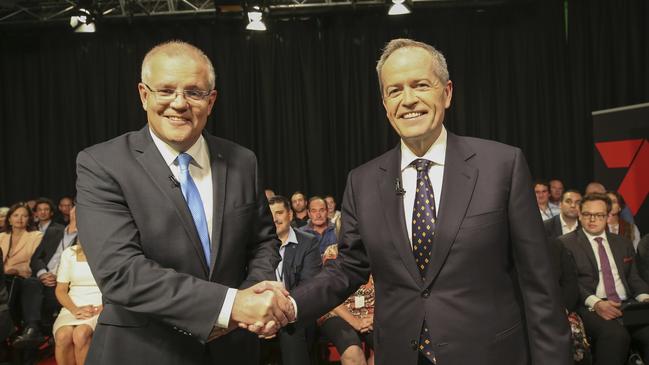
Watched by his wife Chloe, Mr Shorten entered the room with pages of notes, pledging to tackle the “big issues” and ensure middle- and working-class Australians were “back on top”.
But it wasn’t long before the debate turned combative, with the Prime Minister and Labor leader trading barbs as things began to heat up.
Despite his confidence, Mr Shorten stumbled badly on Labor’s franking credit policy, promising an audience member that no pensioners would be hit by the tax grab. He then backtracked slightly, saying it would affect a “small number” of pensioners with self-managed super funds.
But Mr Morrison was not going to let him wriggle away without landing a blow.
“If you have a self-managed super fund and you are a pensioner it hits you … 50,000 pensioners will be hit by the retirees tax that Labor will bring in and it all has to do with self-managed super funds,” the PM said, correcting Mr Shorten.
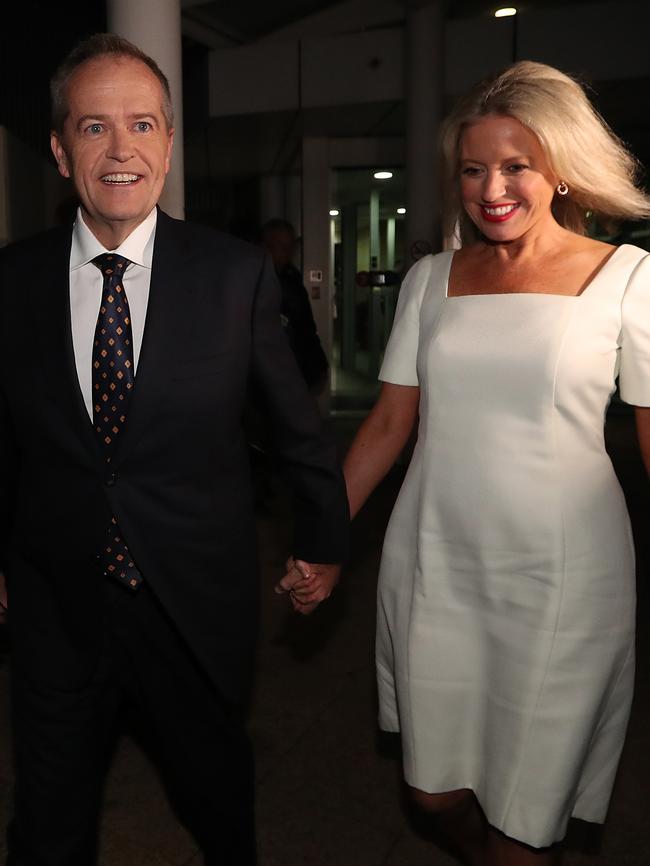
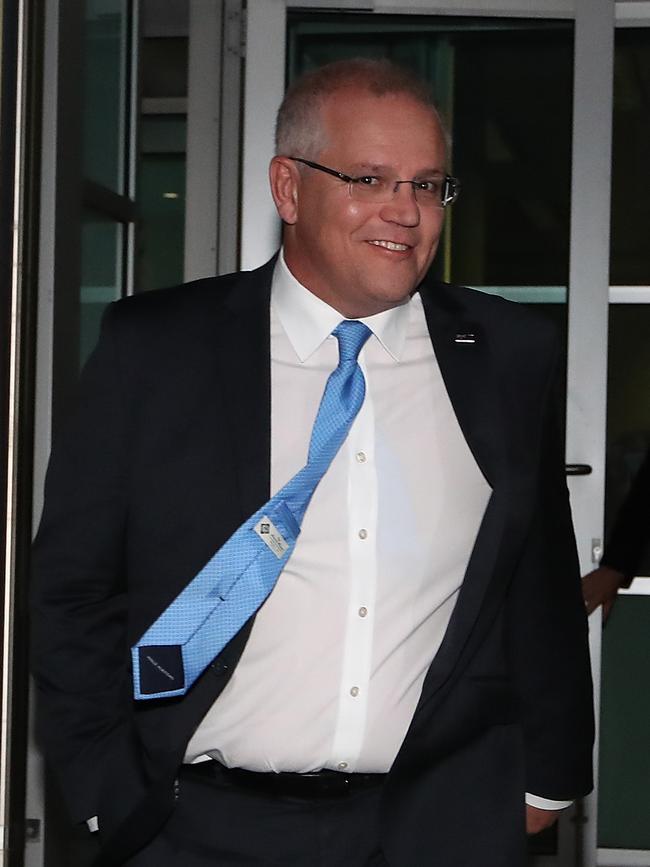
In a second gotcha moment, the Labor leader — whose party has laid out its ambitious electric vehicles target of 50 per cent of new car sales by 2030 — did not know how much a popular model of electric vehicle cost.
The mistake prompted Mr Morrison to interject and reveal the Nissan Leaf could be purchased for $28,000.
“We’ve got a prime minister spending his time on the motor pages, that’s super,” a clearly peeved Mr Shorten said in response.
But Mr Morrison lost ground over his preference deal with Clive Palmer, forcing him to deflect by asking about Labor’s preference deals with the Greens. Mr Shorten fired back by saying a Coalition government would be “hostage” to Mr Palmer and One Nation.
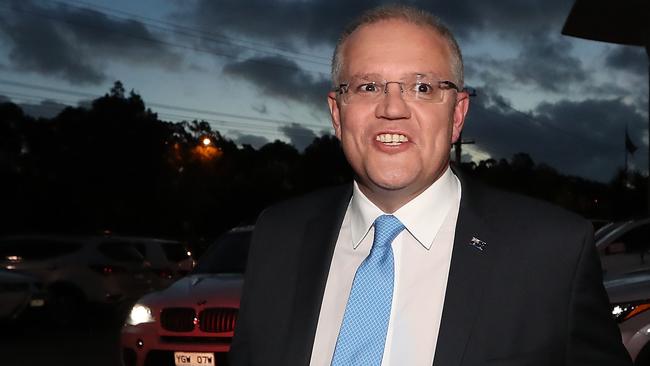
With both major parties still dogged by their multiple leadership changes in the past decade, Mr Shorten and Mr Morrison were both questioned about the record-low public trust in politicians.
Mr Morrison, who has been under pressure to answer why Malcolm Turnbull was ousted, promised if re-elected he would still be in the top job in three years.
Mr Shorten was similarly indirect about his role in leadership spills during the Rudd-Gillard-Rudd years but promised to restore trust by establishing an anti-corruption commission.
— By Annika Smethurst and Claire Bickers
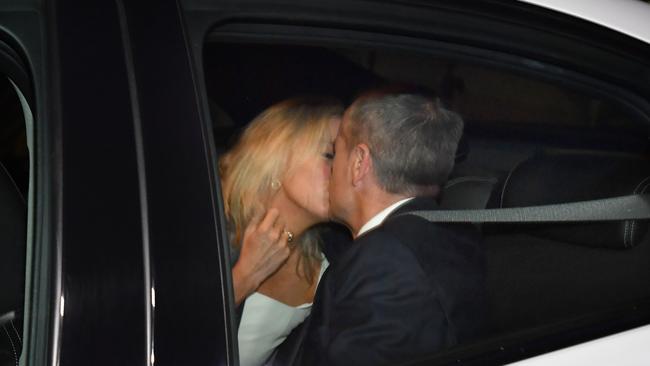
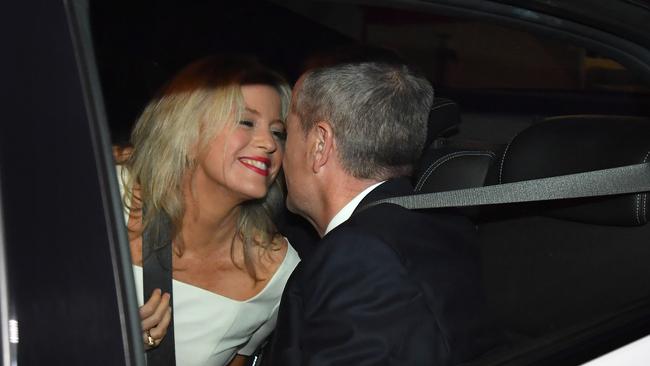
LABOR’S TAX-FUNDED PAY RISE PLEDGE FOR CHILDCARE WORKERS
Bill Shorten has flagged extending Labor’s taxpayer-funded pay rise for childcare workers to other sectors as shares in childcare companies spiked after his wage increase announcement.
Coalition modelling shows that giving a 20 per cent pay rise to six other low-paid sectors would leave taxpayers to foot a massive $30 billion bill.
Business groups slammed Mr Shorten’s pledge to hand about 100,000 childcare workers a pay boost over an eight-year period, warning it would artificially inflate wages and would hit small business in sectors not propped up by the taxpayer.
“We have picked childcare workers to go first, I think this is a strategically important industry,” Mr Shorten said. “I don’t see this as a being an economy-wide approach at all. But I do accept that in certain sectors of the economy we have a wages problem, don’t we?”
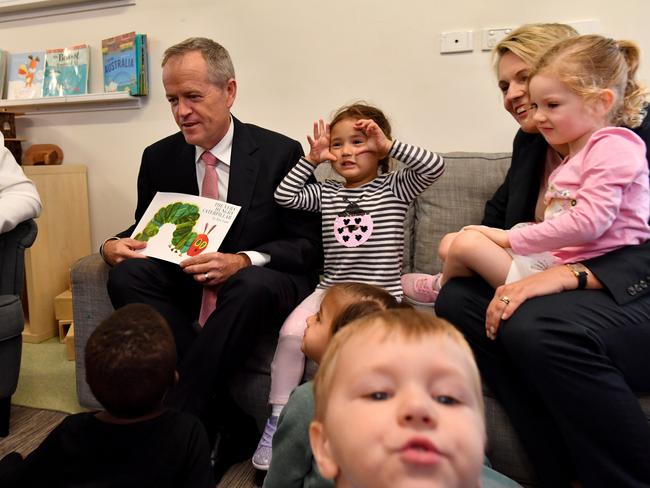
MORE ELECTION NEWS
Federal election: Best and worst moments of the Leaders’ debate
Federal election: Dorky Leaders fall flat in style stakes at debate
Federal election: Shorten’s ‘Robin Hood’ plan to win votes
Mr Shorten was unable to explain how the boost would be delivered but said if elected he would find the money to pay for the childcare pay rise in an “orderly manner across eight years”.
He argued taxpayers had to fund the increase because otherwise it would be passed on to parents who couldn’t afford to pay more for childcare.
“If we don’t put more money into the industry then you can never get a wage rise,” Mr Shorten said.
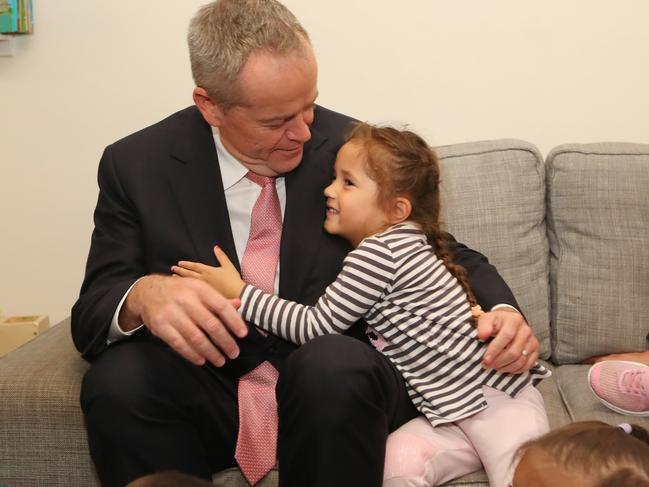
Last year the major providers of childcare collectively had $13 billion in revenue and made $1.4 billion in profits. On Monday shares in ASX-listed childcare companies spiked — including G8 Education, which gained 3.37 per cent to close at $3.07 increasing its market cap by $45 million to $1.4 billion.
Australian Bureau of Statistics data shows the average annual award wage for childcare workers is $53,877, compared with $45,666 in retail, $42,455 in hospitality, $44,031 in aged care, $42,455 in manufacturing, $44,189 in hairdressing and $41,743 in cleaning.
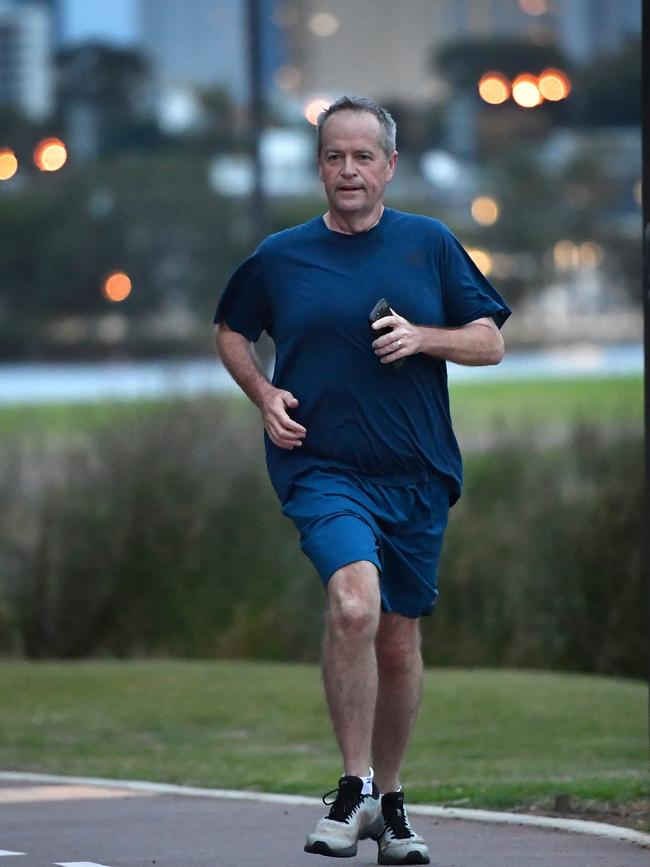
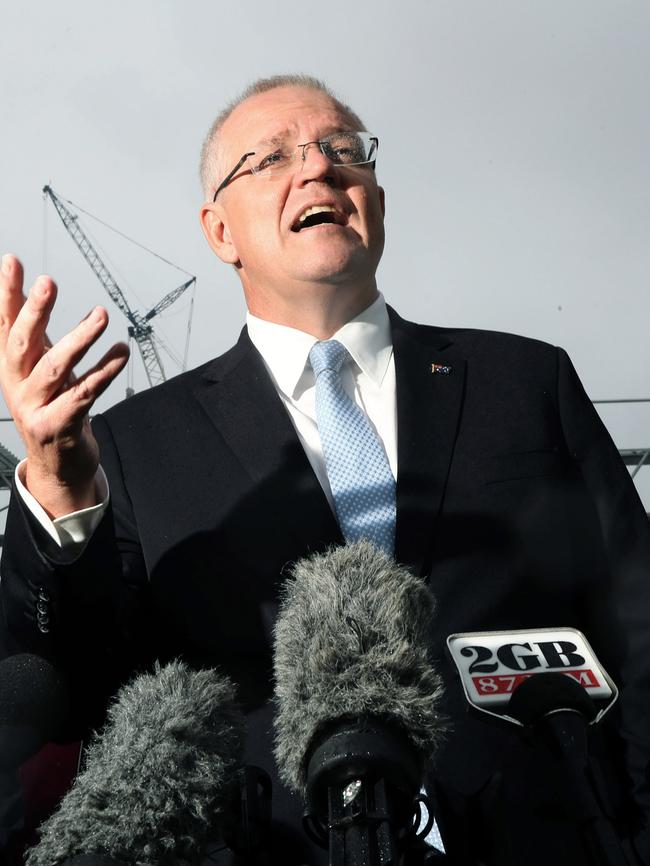
The Coalition analysis shows handing each of these sectors a 20 per cent pay rise would cost $29.65 billion.
Coalition campaign spokesman Simon Birmingham labelled the policy a “staggering intervention” into the labour market, calling it “highly irregular economic policy”.
Australian Chamber of Commerce and Industry chief James Pearson said it was clear Labor planned to “spend taxpayers money in order to pay for wage increases”.
GROWERS FEAR PAY RISE A POISON FRUIT
Cherry and apple grower Guy Gaeta fears Labor’s proposed “living wage” will cripple farmers across Australia and push up the price of fruit and vegetables in supermarkets.
Mr Gaeta has run his family-owned farm near Orange in Central West NSW for 32 years and employs 70 people during the cherry-picking season, which runs from November to mid-January.
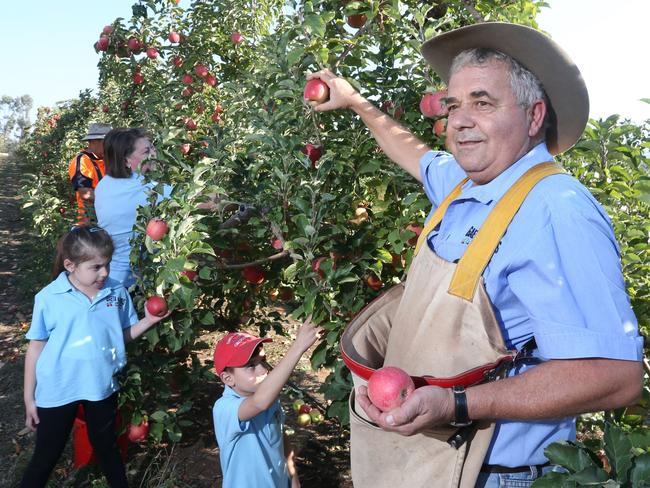
Workers in his packing shed are paid the minimum wage of about $23 per hour while cherry pickers get $14 per “lug” of cherries — which can mean $300-$600 a day.
But Mr Gaeta said if Labor wins the election and introduces the concept of the “living wage” — which is expected to increase hourly rates for workers across the country — then small farms will be forced to close.
“The food industry cannot afford an increase like they are talking about,” he said. “The big boys are going to get more automated farms, and more automated mean they will employ less people. Once we go, prices aren’t going to be so cheap for fruit and vegetables and the consumer is going to end up paying more.”
— Edward Boyd
LABOR’S SUN-SEEKING SCHOOL
Bill Shorten wants to turn Australia’s schools into solar power generators that compete to sell electricity back into the grid.
A Labor government will make available up to $1 billion in government-backed finance for schools to install solar panel and battery systems.
Mr Shorten said solar was a “smart investment” for schools, claiming reduced electricity bills alone could save large schools in NSW up to $89,000 a year.
“Schools are an excellent location for solar investment and the creation of virtual power plants,” he said.
ONE PRICE FITS ALL TO STOP POWER BILL SHOCK
More than 470,000 NSW households will save up to $663 on their annual electricity bill from July under a decision by the energy regulator being announced on Tuesday.
In a boost for the Coalition, the Australian Energy Regulator will hand down a default power price that will also slash bills for more than 75,000 NSW business.
Energy Minister Angus Taylor (pictured) said the decision made good on the Coalition’s pledge to end the “loyalty tax” paid to energy companies Australians who don’t shop around for their power supplier.
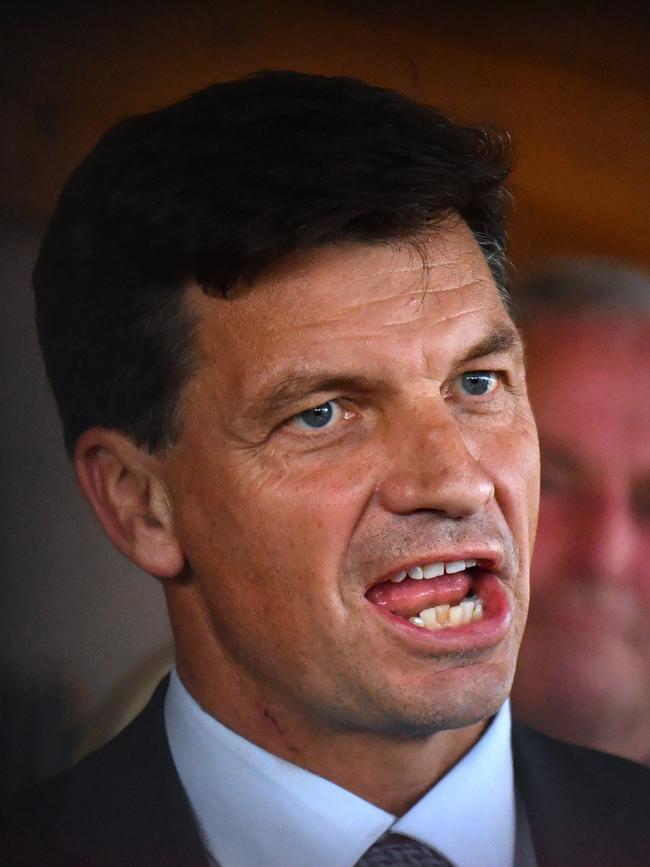
“For too long, the energy companies have been taking advantage of loyal Australian families and small businesses who have been paying the highest electricity prices on the market,” he said.
He said the default offer will cap prices so that the average household in NSW pays no more than $1957 for their power bill and act as a price safety net for those who find pricing and discounts confusing or who simply don’t have time to negotiate.
Mr Taylor told the AER come up with a default offer in October under the government’s response to the consumer watchdog’s landmark report into power prices.
The average customer on a standing offer in NSW will save between $129 and $181.
In regional NSW the savings could be as high as $663, in the southern and western suburbs up to $657 and in the eastern suburbs up to $495.
While the average business customer in NSW would save between $579 and $878.
Across Australia more than 800,000 households will get a better deal on their power bills following the decision.
AER chair Paula Conboy said the default prices would protect consumers who did not shop around.
“Standing offers are no longer working as they were intended and this is causing financial harm to disengaged consumers. Our final decision will bring down bills for most people on those offers,” Ms Conboy said.
— Sheradyn Holderhead
COALITION PARTNERS IN CONFLICT
Nationals in NSW are considering retaliating against their Coalition partner in crucial seats after learning supporters of one Liberal senator have issued rogue how-to-vote cards in a bid to save his position.
Senior Nationals were last night investigating whether the advice by a support camp of Jim Molan to vote below the line on the senate ticket — which would hurt the Nationals’ chances — was against the Coalition agreement.
Mr Molan was given an unwinnable spot by the NSW Liberals last year and his supporters have attempted to intervene by issuing their own how-to-vote cards.
A senior Nationals source said the party was considering hitting back, including with preferences in knife-edge seats like Gilmore in NSW and others Tasmania. Such a move by the Nationals could hurt the Coalition in critical areas.
The how to vote cards urge voters to vote 1 for Mr Molan below the line, before returning to the No. 1 Liberal candidate Holly Hughes. This pushes the Nationals further down the list, which the party believes hinders their chances.
— Anna Caldwell
